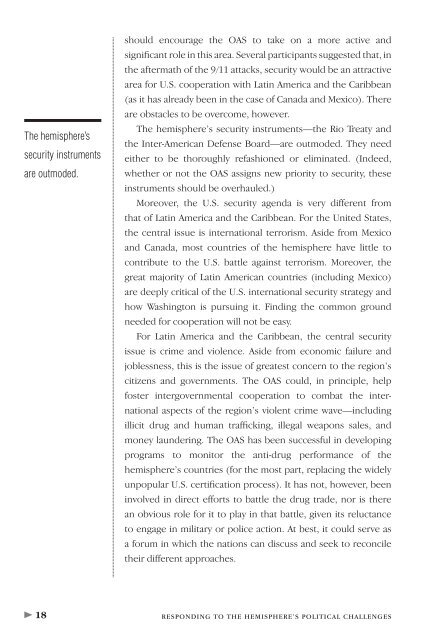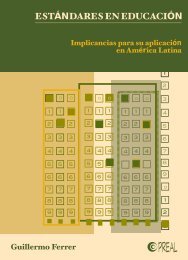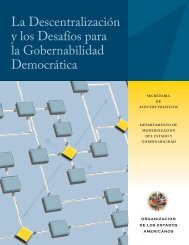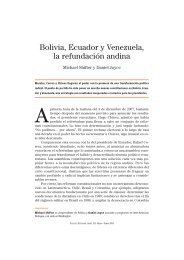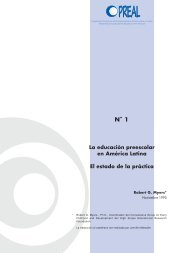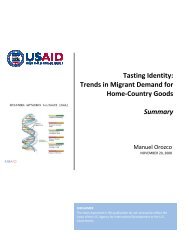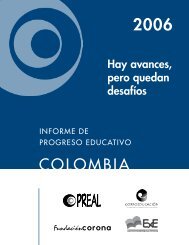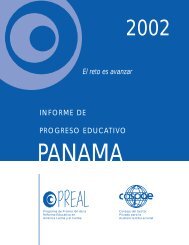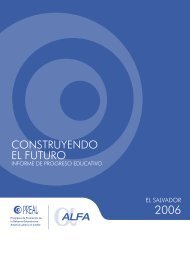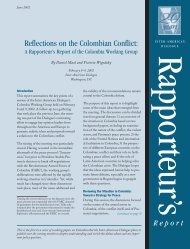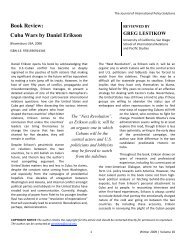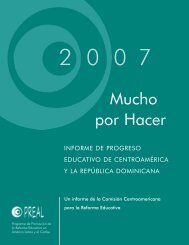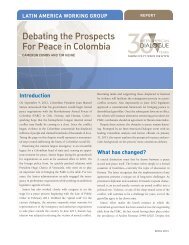View PDF Document - Inter-American Dialogue
View PDF Document - Inter-American Dialogue
View PDF Document - Inter-American Dialogue
You also want an ePaper? Increase the reach of your titles
YUMPU automatically turns print PDFs into web optimized ePapers that Google loves.
The hemisphere’s<br />
security instruments<br />
are outmoded.<br />
should encourage the OAS to take on a more active and<br />
significant role in this area. Several participants suggested that, in<br />
the aftermath of the 9/11 attacks, security would be an attractive<br />
area for U.S. cooperation with Latin America and the Caribbean<br />
(as it has already been in the case of Canada and Mexico). There<br />
are obstacles to be overcome, however.<br />
The hemisphere’s security instruments—the Rio Treaty and<br />
the <strong>Inter</strong>-<strong>American</strong> Defense Board—are outmoded. They need<br />
either to be thoroughly refashioned or eliminated. (Indeed,<br />
whether or not the OAS assigns new priority to security, these<br />
instruments should be overhauled.)<br />
Moreover, the U.S. security agenda is very different from<br />
that of Latin America and the Caribbean. For the United States,<br />
the central issue is international terrorism. Aside from Mexico<br />
and Canada, most countries of the hemisphere have little to<br />
contribute to the U.S. battle against terrorism. Moreover, the<br />
great majority of Latin <strong>American</strong> countries (including Mexico)<br />
are deeply critical of the U.S. international security strategy and<br />
how Washington is pursuing it. Finding the common ground<br />
needed for cooperation will not be easy.<br />
For Latin America and the Caribbean, the central security<br />
issue is crime and violence. Aside from economic failure and<br />
joblessness, this is the issue of greatest concern to the region’s<br />
citizens and governments. The OAS could, in principle, help<br />
foster intergovernmental cooperation to combat the international<br />
aspects of the region’s violent crime wave—including<br />
illicit drug and human trafficking, illegal weapons sales, and<br />
money laundering. The OAS has been successful in developing<br />
programs to monitor the anti-drug performance of the<br />
hemisphere’s countries (for the most part, replacing the widely<br />
unpopular U.S. certification process). It has not, however, been<br />
involved in direct efforts to battle the drug trade, nor is there<br />
an obvious role for it to play in that battle, given its reluctance<br />
to engage in military or police action. At best, it could serve as<br />
a forum in which the nations can discuss and seek to reconcile<br />
their different approaches.<br />
18<br />
RESPONDING TO THE HEMISPHERE’S POLITICAL CHALLENGES


